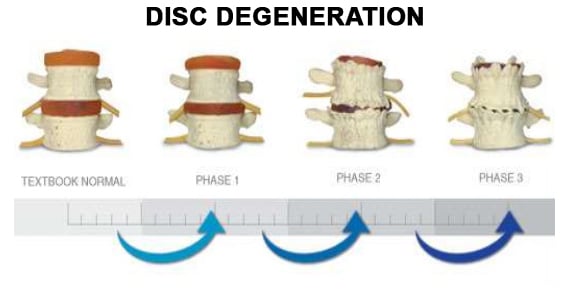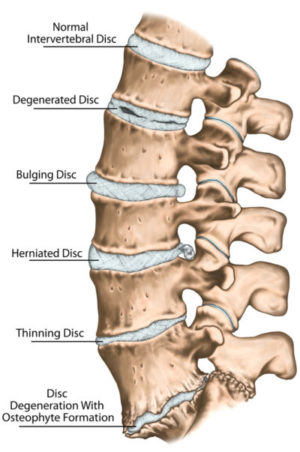Hydration and Motion are two main factors that determine whether or not you will have a healthy spine. Pain or symptoms only come after you have had a loss of one of these for a period of time. Unfortunately, when the spine is not properly cared for, spinal degeneration and ARTHRITIC change take place. For some, this becomes permanent damage and, if further left untreated will continue the degenerative process resulting in a loss of quality of life. Fortunately, chiropractic can help to stop and even repair some of this damage.
1). Drink Water: Spinal discs are made mostly of water, but they can’t absorb water like the rest of your body. The discs don’t have a direct nutritional supply, they lose it just before the teen years. So the discs receive nutrition, including water, through a process called imbibition. Imbibition results only when there is proper motion between the joints above and below the specific disc. The proper motion creates a pump-like effect, and the nutrients are moved in and out of the disc. Adequate hydration is required for it is essential for nutrient delivery. The simplest and healthiest rule of thumb is to drink half of your body weight in ounces. So, if you weigh 140 pounds, you should drink 70 ounces of water daily.
At least 80% of adults experience back pain their lives, and spinal disc dehydration can definitely worsen the pain. Discs work as shock absorbers, but when your discs lose water, they won’t be able to do it. This means that your spine will receive way more pressure from an impact than it normally would. Experiencing discomfort in your lower back could be the result of having thinned discs or a herniated disc. Additionally, back pain can also happen due to an impinged nerve that came from a dehydrated bulging disc. This is why it is very common that your back pain can be related to dehydration.
2). Get Adjusted: Subluxation (restricted, misaligned, or fixated joint) impairs the imbibition process and the nutrient supply to the disc. The lack of water in the spinal disc can lead to disc degeneration. Disc degeneration leads to spinal decay and instability. This decline in spinal health may decrease the functioning of the nervous system — which affects every system, organ, structure, and cell in your body. Thus, a lack of proper hydration impairs the health of the disc, the spine, and ultimately the overall health of the body. Chiropractic adjustments correct the subluxation, thereby improving the imbibition process and the body’s ability to absorb water. The chiropractic adjustment will improve your health!

Chiropractic is the most important thing one can do to ensure that there is proper motion in the spine. Over time, the shape and structure of your spine can change due to repetitive stresses due to daily routines, how we sit, sleep, read, talk on the phone, what we do at work, etc. Because of this, our posture changes gradually and we rarely notice it – until something is very different and maybe we start observing symptoms like pain, numbness, or even muscle weakness or fatigue. Degeneration is occurring in the spine during the time that we rarely feel it. The spine needs motion to stay healthy and because we have had abnormal weight bearing due to the structural change there is limited motion and it starts to break down and degenerate. It is rarely age related, but rather motion related that we find Arthritic damage (degeneration). All segments of the spine are the same age, but normally only find areas of limited motion and increases stress with the most damage.
If you feel like the pain in your back is taking the joy out of once-loved occasions, it might be time to do something about it. The good news is that chiropractic can be the most beneficial thing you can do to get and stay healthy. Correcting or stopping degeneration through chiropractic care can help you stay healthy whether in pain or showing no symptoms at all. If left untreated the degeneration will continue, just like a cavity in a tooth.


